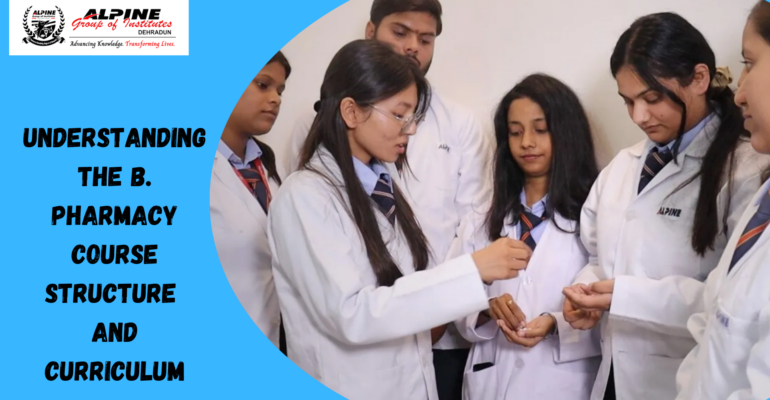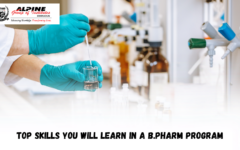Understanding the B. Pharmacy Course Structure and Curriculum
2025-01-07 9:36Understanding the B. Pharmacy Course Structure and Curriculum
The Bachelor of Pharmacy (B. Pharm) is a four-year undergraduate program that offers students the necessary education and training to pursue a career in the pharmaceutical industry or healthcare sector. The course covers a broad range of subjects that focus on the preparation, dispensing, and proper use of pharmaceutical drugs. Below is an overview of the typical course structure and curriculum of the B. Pharmacy program.
1. Course Duration and Eligibility
- Duration: 4 years (8 semesters)
- Eligibility: Typically, students need to have completed their 12th grade (senior secondary school) in the science stream with Physics, Chemistry, Biology, and Mathematics as subjects. Some universities may require students to clear an entrance exam as part of the admission process.
2. Course Structure
The B. Pharmacy course is divided into 8 semesters, with each semester covering theoretical knowledge, practical training, and lab sessions. Some universities may also offer internships or industrial training as part of the curriculum.
Year 1: Foundation of Pharmacy
In the first year, students focus on building a solid foundation in science and basic pharmacy-related subjects.
- Semester 1:
- Pharmaceutical Chemistry I: Introduction to the basic principles of chemistry, including organic and inorganic chemistry, with an emphasis on drugs and their chemical properties.
- Human Anatomy and Physiology: Study of the structure and function of the human body, focusing on systems like the circulatory, respiratory, and nervous systems.
- Pharmaceutics I: Introduction to dosage forms, their formulations, and techniques involved in drug preparation.
- Biochemistry: Basic biochemistry concepts, including enzymes, proteins, and metabolic pathways.
- Computer Applications in Pharmacy: Introduction to the use of computers and software in the pharmacy field.
- Semester 2:
- Pharmaceutical Chemistry II: Further study of chemistry with a focus on medicinal chemistry.
- Pharmaceutics II: Continuation of dosage forms, focusing on drug delivery systems and formulations.
- Microbiology: Study of microorganisms and their role in pharmaceutical practices, including sterilization and aseptic techniques.
- Biostatistics: Introduction to statistics, important for drug development and clinical trials.
- Environmental Science: Study of the impact of pharmaceutical practices on the environment.
Year 2: Core Pharmaceutical Studies
In the second year, students delve deeper into subjects related to drug formulation, pharmacology, and drug interactions.
- Semester 3:
- Pharmacology I: Introduction to the study of drugs and their effects on the body, including mechanisms of action and therapeutic uses.
- Pharmaceutical Analysis I: Analytical techniques for drug quality control and testing, including chromatography and spectroscopy.
- Pharmaceutical Biochemistry: Study of biochemistry in relation to pharmacy, such as drug metabolism and enzymatic activities.
- Pathophysiology: Understanding of the physiological processes that lead to diseases.
- Pharmaceutical Engineering: Introduction to the principles of pharmaceutical production and design.
- Semester 4:
- Pharmacology II: Advanced pharmacology covering a broader range of therapeutic areas and drug interactions.
- Pharmaceutical Analysis II: Advanced analytical techniques for pharmaceutical products.
- Medicinal Chemistry: Study of chemical properties of drugs and their effects.
- Pharmacognosy: The study of medicinal plants and their pharmacological properties.
- Clinical Pharmacy: Introduction to the practice of pharmacy in clinical settings, including patient counseling and drug therapy management.
Year 3: Specialization and Application
In the third year, students apply their knowledge to more advanced topics, including drug formulations, clinical trials, and pharmacy management.
- Semester 5:
- Pharmacology III: Study of advanced drug effects, clinical pharmacology, and therapeutic drug monitoring.
- Pharmaceutics III: Advanced techniques in drug formulation, including controlled-release and targeted drug delivery systems.
- Pharmacy Practice: Focus on the role of pharmacists in healthcare settings, patient safety, and medication management.
- Biopharmaceutics: Study of how the body absorbs, distributes, metabolizes, and excretes drugs.
- Regulatory Affairs: Overview of laws, regulations, and ethical issues related to the pharmaceutical industry.
- Semester 6:
- Pharmaceutical Biotechnology: Study of biotechnology in drug development, including gene therapy and recombinant drugs.
- Pharmacovigilance: The science of monitoring the effects of pharmaceutical drugs and ensuring their safety.
- Pharmaceutical Marketing: Marketing principles related to pharmaceutical products and the healthcare industry.
- Cosmetic Science: Study of cosmetics and personal care products, including their formulation and regulation.
- Industrial Pharmacy: In-depth study of drug manufacturing processes and quality control systems in the pharmaceutical industry.
Year 4: Internship and Project Work
The final year typically includes internship opportunities, where students work in pharmaceutical companies, hospitals, or research labs. Students also engage in research projects, which allow them to explore specific areas of interest in pharmacy.
- Semester 7:
- Pharmacy Management: Management skills needed to run a pharmacy, focusing on financial aspects, operations, and human resource management.
- Pharmaceutical Technology: Study of new technologies in drug formulation and delivery systems.
- Advanced Pharmacology: Further study of drug effects, including bio pharmacological techniques.
- Pharmacy Practice and Clinical Research: Advanced topics in pharmacy practice and clinical research methodologies.
- Semester 8:
- Project/Dissertation: Students are required to complete a research project or dissertation related to a specific area of pharmacy.
- Internship/Industrial Training: Practical experience in a pharmaceutical company, hospital, or research setting.
3. Practical Training and Labs
Throughout the B. Pharmacy course, students gain hands-on experience through practical sessions in labs. These sessions cover drug formulation, analysis, and other essential aspects of pharmacy practice. In the final year, internships in pharmaceutical companies or healthcare institutions give students an opportunity to apply their knowledge in real-world settings.
4. Assessment and Examination
The B. Pharmacy program includes a combination of internal assessments (such as quizzes, assignments, and lab work) and end-of-semester examinations. The exams typically focus on both theoretical knowledge and practical skills.
5. Conclusion
The B. Pharmacy course structure is designed to provide students with comprehensive knowledge of pharmaceutical sciences, combined with practical experience, to prepare them for diverse careers in healthcare, research, regulatory bodies, and the pharmaceutical industry. Upon graduation, students can pursue further studies or enter the workforce in roles like pharmacists, researchers, drug manufacturers, or quality control specialists.
The curriculum ensures that graduates are well-equipped to handle the challenges of the evolving healthcare sector, including drug development, patient care, and the ethical distribution of medications.








